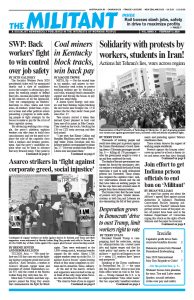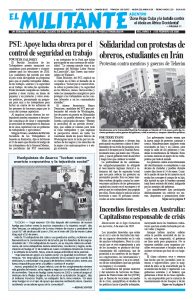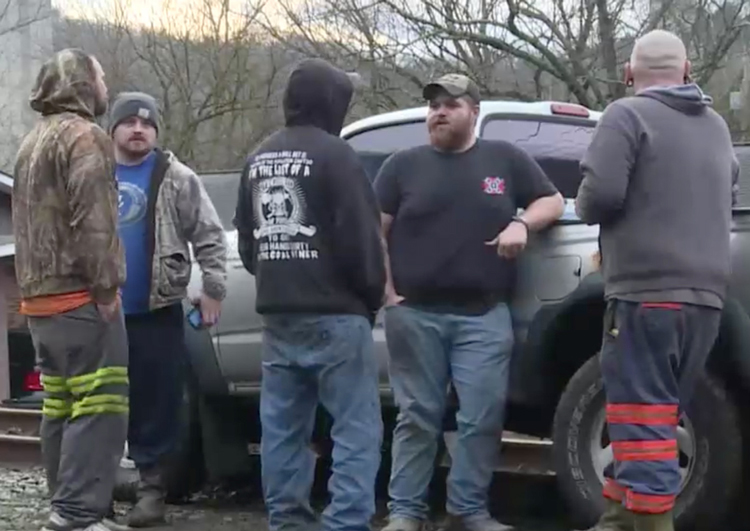META, Ky. — For the second time in six months, coal miners in eastern Kentucky took action to protest working without pay by blocking a coal train, winning broad community support and forcing the bosses to pay what was owed them.
A dozen Quest Energy coal miners and their families began blocking the rail tracks near Kimper Jan. 13 to protest the fact they hadn’t been paid since Dec. 27.
Two miners started it when they learned Quest planned to haul coal from one of its mines in Pike County. They stood on the tracks, blocking the 120-car CSX train carrying coal they had mined.
“I got texts that Kenny Collins and Brandon Blackburn were down there,” roof bolter Dylan Davidson told this Militant worker-correspondent by phone Jan. 17. “I live two seconds from there so I drove over and joined them.”
Davidson, who now works at Quest’s Carnegie mine, got to know Collins and Blackburn when he worked at Quest no. 15 mine.
“We’re not just co-workers, we’re like brothers,” Davidson said. “We spend more time with each other than with our family. And I wanted my payday — three weeks without getting pay!”
Other miners and their families soon joined them, and many other workers came by with both moral and material support. “Monday night we had 14, including some of our wives,” Davidson said. “My wife Katie came up a couple of times. People brought us pop, water, firewood, pizza, cornbread, sleeping bags, sheets, covers and chairs. The whole community was behind us 100%.” Donations included a tent for shelter and a port-a-potty.
Miners whose pay was stolen by bosses at Blackjewel mine in Cumberland blocked a coal train for two months last summer, until they had won what they were owed. Their victory, and the support they received, has been absorbed by miners here and other workers. “I have friends that worked over there,” Davidson said.
On Jan. 14, Quest paid miners the straight pay they were owed, but not vacation and overtime pay. “When they paid the two weeks some left, but five of us stayed,” Davidson said, determined to get every penny.
The next day a representative of Quest Energy as well as some other company workers came to the protest site and tried to get the protesters to leave the tracks. Davidson and the others said that they’d leave when they got all the pay owed them. Later that day, they all got their full pay and declared victory, taking down the blockade.
Eastern Kentucky was once a United Mine Workers of America union stronghold, but there are no union mines here today. Many retired union miners live here, and the legacy of UMWA militancy reverberates broadly in the working class.
“They won,” Lisa Scalf, mother of Davidson’s wife Katie, told us when we knocked on her door in a small hollow here and were invited in for refreshments. “They got what they wanted. I told Katie, this is no different from when my daddy was a union miner for 30 years. You stay out for what you want. Unions are solidarity.”
And what the Quest miners did — act together in solidarity to resist the bosses’ attacks — is the heart of what unionism is.
We had just visited down the hill with Scalf’s mother, Barbara Hale, a retired grocery worker, and her husband Harold, a retired union miner and veteran of many strikes, who has black lung and is fighting for benefits.
“We’re 100 percent union,” Barbara Hale told us. Her father was a UMWA union organizer. “It’s a shame when a man goes out there and mines coal and doesn’t get his money.”
When Quest bosses said those blocking the tracks were holding the coal “ransom,” the miners and many others protested. “They weren’t asking for something that wasn’t theirs,” Scalf said. “They were just demanding what they had earned!”
Satisfaction with the miners’ victory is widespread. “I thought what they did was honorable,” disabled mine mechanic Danny Coleman told us at his doorstep in Pikeville, the largest town in the region. “If you miss a payday you’re behind, it’s hard to catch up.”
Winning in just three days surprised Davidson. “I didn’t expect to win it as quick as we did,” he said.
This victory, like the hard-fought Blackjewel protest last summer, will inspire others. Co-workers at the Walmart store in Louisville where this worker-correspondent works had asked me to convey their messages of solidarity. When produce worker Cindy Poindexter heard about the victory, she wrote me, “That’s great! They deserve it.”
Tony Lane, a former coal miner from Pittsburgh, contributed to this article.


